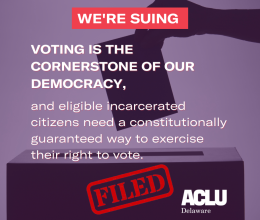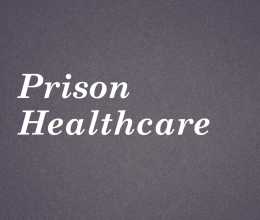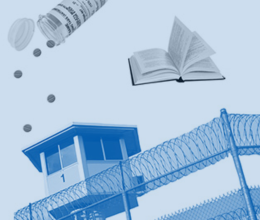
America is home to only 5% of the world’s population yet imprisons 25% of the world’s prisoners. Delaware is an unfortunate leader in this trend. Delaware has the tenth most prisoners per capita in the United States. We incarcerate Delawareans at roughly twice the rate of states like New Jersey and Minnesota. The predictable consequence of stuffing our prisons with non-violent offenders is that our prisons have become overcrowded. Correctional officers are underpaid and prisons are understaffed. Resources that experts say make prisons safer, like adequate mental health care for inmates, have been sacrificed.
Delaware has the tenth most prisoners per capita in the United States. We incarcerate Delawareans at roughly twice the rate of states like New Jersey and Minnesota.
The ACLU of Delaware is working to fix this problem in two ways. First, we are working to ensure that minimal standards for the conditions of confinement in Delaware prisons are met despite the high rates of incarceration. In August 2016, Community Legal Aid Society, Inc. (CLASI) and the Delaware Department of Corrections (DDOC) entered into a settlement agreement negotiated as a result of a lawsuit litigated by the ACLU, CLASI, and a private law firm on behalf of over 100 seriously mentally ill inmates being held in solitary confinement 165 hours per week with virtually no mental health treatment. The settlement reforms restrictive housing (also known as solitary confinement) and mental health care.
The settlement provides for increased staffing and expanded prison facilities to provide better mental health programming for maximum security inmates. In addition to preventing mistreatment of these inmates, these changes make everyone safer. The changes bring Delaware into line with what many other states are already doing and with standards established by the American Psychiatric Association and the American Correctional Association for conditions of confinement and the treatment of people with mental illness in prison. The settlement does not require DOC to change a prisoner’s location in a way that would result in a less secure prison environment.
Eldon Vail, former Secretary of the State of Washington Department of Corrections, said of the settlement, “Involving mental health professionals in the operation of correctional facilities improves security and makes the facilities safer. When a prison has sufficient mental health staff dealing with inmate mental illness, correctional officers are better able to do their jobs. Jurisdictions around the country that have reformed solitary confinement and involved mental health professionals have seen the level of violence go down in their prison systems. Adequate mental health care in correctional facilities is also important to make our communities safer, because most inmates are eventually released.”
We are also fighting the underlying problem: mass incarceration. We support reentry services that reduce recidivism, dismantling the collateral consequences of conviction that keep people stuck in the criminal justice system, abandoning failed drug war tactics, and reforming sentencing laws to ensure that we do not imprison people for longer than necessary to punish and rehabilitate them.
Until Delaware solves its mass incarceration problem, we need to fully fund prisons and prison staff, including by providing clear rules and adequate training to carry out their duties at the highest standards of professionalism. But the long-term solution is not more guards—it is fewer prisoners. We cannot and need not continue to devote larger and larger portions of the state budget to prisons instead of schools and other important priorities.








